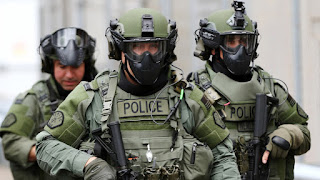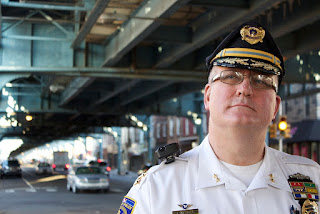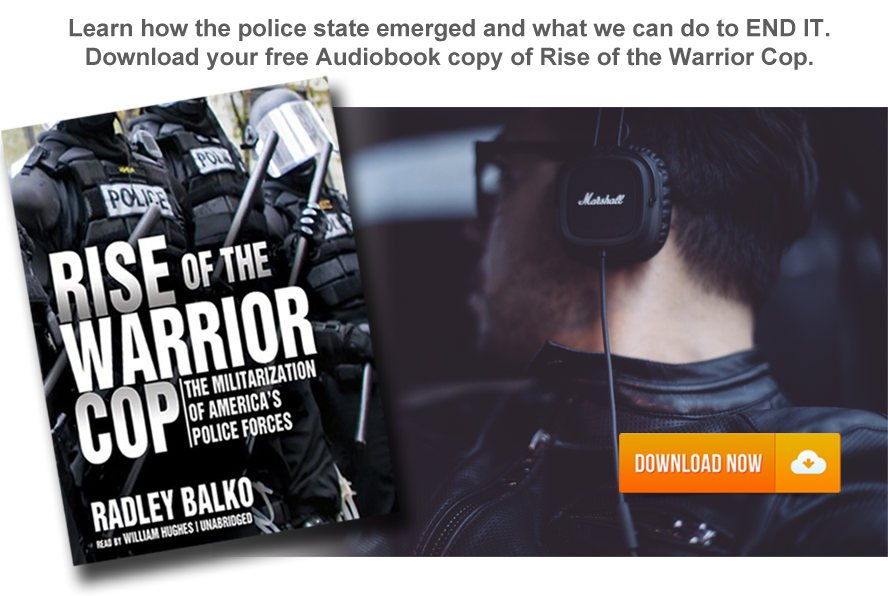
Glenn Beck, acting in his self-appointed role as a punitive populist prophet, has urged his audience to join “hand-in-hand, arm-in-arm,” and “ring” their local police departments in prayer.
The local police are “under siege,” Beck tremulously insists, and divine intervention on their behalf is necessary.
Beck hasn’t yet urged Americans to act as human shields on behalf of the heavily armed, body armor-clad functionaries who are supposedly paid to protect them.
Some police union officials haven’t shied away from suggesting that the public has a moral duty to protect the police, despite the fact that police have no reciprocal obligation to protect individuals threatened with criminal violence.
Residents of Huntsville, Alabama who declined to intervene to help a police officer subdue a suspect could face criminal prosecution under a state statute requiring them to assist an officer in trouble.
Had the situation been reversed, however, police officers would face neither criminal nor civil prosecution for declining to aid a citizen under assault by a suspect.
A man named Devonte Conerly who was suspected in a hit and run incident, allegedly tried to disarm the police officer who stopped him.
Several officers responded to a call for assistance and eventually subdued and handcuffed Conerly. They then rebuked several bystanders who had declined to intervene.
“I wouldn’t ask anybody in the public [sic] sector to get involved in a shootout or anything like that,” commented Bill Davis, the immediate past president of Alabama’s Fraternal Order of Police. However, he continued, “if it’s just an altercation where someone is wrestling with the officer and it looks like they’re getting the best of the officer, yes you need to help.”

In fact, under the Alabama state legal code (Section 13A-10-5), “A person commits the crime of refusing to aid a peace officer if, upon command by a peace officer identified to him as such, he fails or refuses to aid” the officer in effecting a “lawful arrest” or preventing “the commission by another person of any offense.”
This dereliction of a supposed duty is described as a Class C misdemeanor.
This power of summary verbal conscription by police, as liberty activist Matt Agorist has noted, is written into law in 44 of the 50 of the state-level subdivisions within the American soyuz. Davis is hardly the first police official to express disgust and outrage over the reluctance of the public to intervene on behalf of an officer during an altercation.
“I was horrified,” quavered Philadelphia SEPTA Police Chief Thomas Nestel, commenting on an incident in which Philadelphia transit officer Samuel Washington was thrown to the ground and pinned under a bench by a suspect. “I’m frightened for my cops….. To go out every day they work really hard and try to … make people feel safe but they rely on people to help.”

Like most people in his profession, Nestel apparently suffers from occupational tone-deafness: Police make people “feel safe,” he observes, but they rely on the public to protect them.
Nestel expects the public to be governed by the assumption that anytime a police officer is involved in a violent encounter, the officer is in the right – and that if the target of the officer’s attention is resisting, bystanders have a legal obligation to help subdue the “suspect.”
Under Alabama’s statute, onlookers are not liable to prosecution if the failure to render aid “was reasonable under the circumstances,” but the burden of demonstrating that this is the case is placed upon the accused:
“A person is not liable under this section if the failure or refusal to aid the officer was reasonable under the circumstances. The burden of injecting this issue is on the defendant but this does not shift the burden of proof.” (Emphasis added.)
While this formulation doesn’t require that a defendant prove his innocence during a trial, it assumes that a “refusal to aid” an officer is unreasonable, and places on the accused the “burden” of overcoming that presumption. The default assumption is that the accused committed an offense by doing nothing.
Of course, in the event that a citizen obeys a police officer’s command to intervene, and is unable to help subdue the suspect, he could conceivably find himself charged with obstruction, which is a Class A misdemeanor.
This means that a police officer can charge an onlooker who declines to participate in an arrest, or – conceivably – one who makes an unsuccessful bid to help. It should also be remembered that a citizen, unlike a police officer, is not protected by “qualified immunity” in the event the subject of an arrest is injured without justification.
In any case, citizens are told that they have a legal duty to come to the aid of an embattled police officer – but police have no corresponding duty to intervene on behalf of a citizen.
It is a well-established legal principle that police officers are not criminally nor civilly liable when they fail to protect individual citizens from specific acts of criminal violence.
The seminal 1981 decision Warren v. District of Columbia held that it is a “fundamental principle of American law that a government and its agents are under no general duty to provide public services, such as police protection, to any individual citizen.” (Emphasis added.)

In that case, two women reported an assault on a friend to the police. Officers were dispatched to the scene of the crime, but declined to enter the building.
The desperate women called again, and this time the department didn’t even bother to respond. The attackers overheard the second call, and punished the women who had sought police assistance by detaining and assaulting them for 14 hours.
Police have “no special duty” to aid a citizen facing an immediate lethal threat, contended David Santoro, City Attorney for New York, in a successful bid to dismiss a lawsuit filed by Philadelphia native Joe Lozito.
Lozito was nearly killed while subduing a slasher-killer named Maxim Gelman during a 2011 subway attack. Lozito, an unarmed man trained in mixed martial arts, tackled and subdued Gelman, who was being sought for the murder of three people.
–> Continue reading full article at Pro Libertate.


